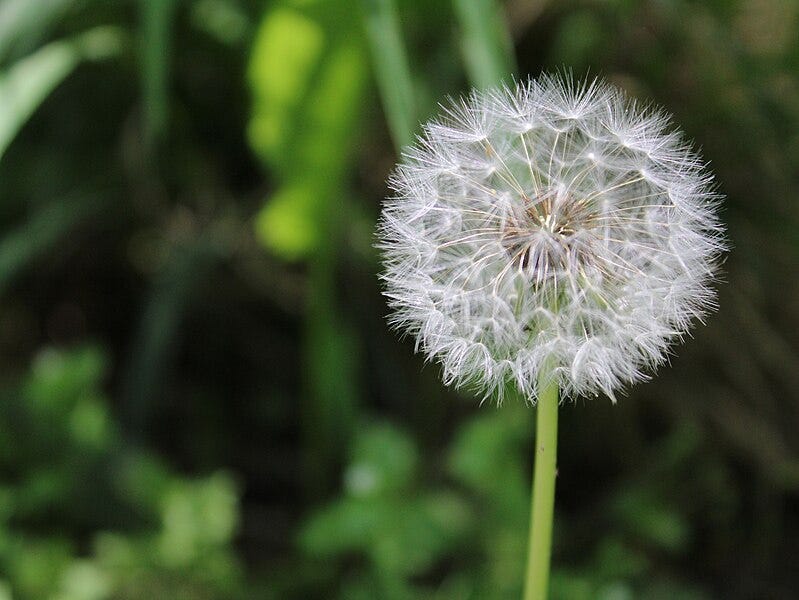Garden Space
Are gardens, governments, and the media all the same?
In Tom McCall and The Subarurals, Joel (gently) critiques the tendency of some city folks to import their political behaviors when they move to the country. To perhaps speak more than they might listen.
In the following I respond using an environmental metaphor to explore how informational gates are kept in different contexts. Keeping an eye on who gets to know, speak, or disagree.
There are dandelions in our yard.
Of course there are. These classic weeds — perhaps the most famous weed, or flower, of all — are all but impossible to eliminate without committing to a recurring chemical regimen many would rather avoid. So, our beautiful yard is full of birds, bees, squirrels, and some fast-growing stems in need of being regularly whacked. Not too many.
My mother-in-law's yard has none of these. Her quarter acre is smooth and green, with nary a dandelion in sight, nor much of anything else but grass, unless it is in a pot or surrounded by pavers and weed barrier. The Feds have proven her preferred yard treatment causes cancer but she sprays it on anyhow. She loves her smooth, monochrome, tightly manicured, weed-free yard. She will not have it any other way. She keeps a steady watch on it, smoking on her back porch. Nothing lives in her lawn and garden without her consent.
Photo Credit: Humoyun Mehridinov “A Dandelion in the Tashkent Botanical Gardens,” Lic. CC4.0
Recently I was reminded of the military term information space. It describes what is known and knowable in any given place or situation. Such a space may be considered relatively wild or manicured depending on the level of censorship, propaganda, and cultural control in place to maintain a desired information state (remember The Truman Show?)
So, are words we read and the thoughts they provoke like weeds? Flowers? Says who? Who are the gardeners for any given information space, and where are their tools? Is there a universal definition of weed? Or, is beauty in the eye of the beholder all the way up and all the way down?
Seen as gardens, information spaces are cultivated and grown quite differently from place to place. In Portland, competing notions about housing, addiction, and food-supply solutions roam wild through popular dialogue. In Helena, Montana (pop. 33,885), similar ideas show up, too, in a few big plantings. Helena Food Share has a strong community presence, as does a robust-by-local-standards homeless shelter named God's Love. But, there are also plenty of folks, both here and back in Portlandia, who would weed-spray most of the solutions proposed by Portland's Street Roots, in pursuit of manicuring their town as they prefer to see it: smooth, even, monochrome, and clean. When plans got rolling to open a new women’s shelter in downtown Helena, the building to be rented was suddenly sold off to a buyer with no interest in making space for the project1.
But again, who decides? Western-style federated constitutional democracy provides a porous, multi-layered decision making process for enacting laws and policy. Its water hoses are often knotted and the garden fencing is tatty. Our Local, State, and Federal governments leave plenty of room for patches to go fallow, and for weeds and seeds to blow in and around. By contrast, less porous governments deliver political seed, weed-spray, and fertilizer through fewer, but longer-lasting and more individually powerful spray nozzles, like Vladimir Putin’s mouth. China’s particular garden fence is notably tight. Every word entering or leaving it is filtered through a great digital firewall. Gardeners in China may knock on your door in the night with questions about your fertilizer, particularly if you are Uyghur.
Media sources could also be viewed through this gardening metaphor. Old media is tightly fenced and weeded. Stories simply do not appear in the The New York Times unless some editor deems them “fit to print.” On the other hand, new media tends to be weedy and wild, as any two minutes scrolling Twitbook or Xstagram will prove. The big new media gardens look more like the alleys behind half-abandoned shopping malls, thick with shady boys spinning “buy now” signs, as they dance to some tune we cannot hear.
My husband loves gardening. New plants appear often. He knows every nursery in the region. Old roses are trimmed. Bulbs are planted. Ferns are nurtured. Ceramic pots and statuary are artfully built. Dandelion stems die in the weekly mow-down, and water may well be sprayed with a gin and tonic in his hand. There is a happy coherence to it all, though some of the plantings predate us at this house. He took our organic inheritance and built on it. Birds love it. Weeds find it. Bees buzz. It is beautiful and feels healthy. It is certainly a nice place to sit out for dinner when the temperature allows.
Going back to the media, though, hate speech laws, like the Online Harms Act being promoted in Canada2, seem like potent weed-spray, with proposed measures that would reach across the internet and back in time to prosecute people for their words. Words the Canadian government finds weedy would be rounded up and killed off so aggressively some might hesitate to speak their mind at all. Folks might not want to risk picking a dandelion puff and giving it a blow to watch wild seeds sailing across the yard, like any silly kid.
But, imagine the resulting garden: smooth, even, monochrome, and clean.
Future uncertain for planned women's shelter in Helena
https://www.ktvh.com/news/future-uncertain-for-planned-womens-shelter-in-helena
Backgrounder – Government of Canada introduces legislation to combat harmful content online.
Canada’s Extremist Attack on Free Speech
https://www.theatlantic.com/ideas/archive/2024/06/canada-online-harms-act/678605/



